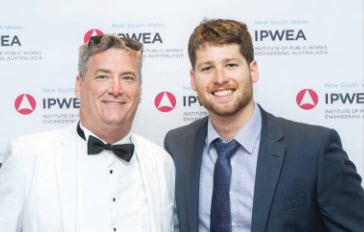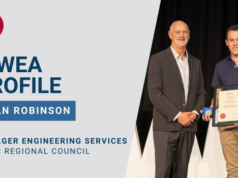In skill development, leadership lessons and career advice, young engineers benefit hugely from mentorships programs such as YIPWEA’s Coffee Cup Challenge.
When Alan Hay agreed to participate in Young IPWEA’s mentor program – the ‘Coffee Cup Challenge’ – with 21-year-old engineering up-and-comer James Thompson, it soon became clear that the benefit of knowledge transfer would travel both ways.
Hay is National Strategic Analyst with the Australian Roads Research Board (ARRB). In a career spanning more than 30 years, he has spent over a decade in road safety advocacy, and his innovations have been recognised by the Australasian College of Road Safety. Currently, he has responsibility for government relations, the National Interest Services Program and the local government sector at ARRB.
Thompson, meanwhile, is an Engineering Major at Charles Sturt University and a Cadet Engineer at the Eurobodalla Shire Council. He was one of the first participants in the informal mentor program initiated by IPWEA’s under-35s membership group, YIPWEA, designed to facilitate informal engagement between young and experienced professionals; provide exercises, activities, guidelines and milestones as guidance; and ensure all participants and their organisations receive benefit from the program. As a bonus, it was a welcome development for Thompson to be able to repay Hay for his time by assisting with one of ARRB’s major publishing projects.

How a young engineer can make a difference
Using a $2.6 million Commonwealth grant, ARRB is reimagining its Local Government Best Practices Guides. The series is intended to help local councils more effectively design, construct and maintain roads and bridges.
These practical documents speak the language of local government and build on direct engagement between the parties involved for high-standard results.
As a result of the contact with Hay, Thompson became a participant in ARRB’s outreach program for the new guides. In his own time, he provided important feedback on their delivery medium, format and usability and suggested improvements based on his own workplace activities in road upgrades and related work.
“ARRB wanted to ensure the broadest level of feedback from across Australian local governments and from multiple grades of expertise,” says Hay.
“James provided a five-page review based on his grade and understanding of the public sector and I’m proud to say that the majority of his suggestions will be implemented.”
Building a civil engineering career
Thompson’s interest in local government began when the Young IPWEA NSW ambassador at the time, Cate Fennell, visited Charles Sturt University and gave some public works engineering career advice, presenting to students on the benefits and breadth of skills that can be gained from working in the sector.
Fennell’s talk was part of YIPWEA’s drive to educate students about the solid career foundation to be had in local government, an opportunity that is commonly overlooked because graduates tend to flock to the private sector for its perceived prestige. Many fail to realise the significance in crossover of various public works jobs and their impact on career development over time.
What graduates are missing, Thompson explains, is that often the private sector requires their engineers to specialise in a specific area of engineering, such as stormwater analysis or structural design.
“When you have just started out in engineering, you don’t truly know what you will be doing 10, 20 or 30 years,” he said.
“Local government is the perfect environment for young engineers to build a range of different skill sets they can use, whether they decide to stay in the public sector or specialise and move into the private sector.”
Fennell’s insights and examples convinced Thompson that the public sector could give him a broader understanding of the field that he could apply to any future career path.
“Local governments are often under-resourced and underfunded, and there’s always more work than is able to be done,” said Thompson.
“This means as an engineer you are constantly being tested and exposed to new problems or issues that often require unique and creative solutions, leading to the accelerated development of your critical thinking and problem-solving ability, which are two fundamental characteristics of a good engineer.”

The importance of civil engineering mentors
Thompson believes he’s lucky to work for the Eurobodalla Shire Council, which he describes as one of the most well-run councils in Australia. However, he acknowledges there are gaps in his learning potential that can be enhanced from other sources, due to their better access to resources and research, and with advanced technical capabilities that can be in limited supply at many local governments.
That’s where Alan Hay and the Australian Road Research Board (ARRB) come in.
Hay’s background includes architecture, project management and construction. He has spent more than two years at ARRB, a not-for-profit that provides independent and expert transport advice to road planning decision-makers as well as technical services for all levels of government, academia and the private sector.
Thompson and Hay had previously met at an IPWEA event and when Thompson joined the Coffee Cup Challenge, he realised that Hay could help him navigate the early stages of his engineering career. The challenge encourages young engineers to take the initiative and seek out an ideal partner, based on individual goals and aspirations.
When Thompson approached him, Hay had a good feeling about the connection.
“Look, mentoring someone is a big responsibility. The advice you give can shape a person’s future, so it’s not something you take lightly,” says Hay.
“But James had the capacity to hold mature conversations and communicate to me what he was wanting to do. I could sense that he knew what he wanted to get out of it and had some inkling of where he wanted to go.”
Putting facetime first
The Coffee Cup Challenge is an informal agreement that emphasises the value of face-to-face contact. It also follows a 20-week program to ensure constructive results. A comprehensive support pack describes the program’s purpose, sets out participants’ roles and outlines expected milestones.
Three informal ‘coffee meetings’ take place, which are guided by exercises. The first session is an icebreaker; the second dives into the mentee’s five-year career plan; and the third is for the mentor to assist with their knowledge and networks, to help the mentee move through any pain points or career roadblocks.
With Hay’s input, Thompson recently completed his five-year career plan. He will continue working at Eurobodalla Shire Council to develop his technical knowledge in pavement engineering and build his practical experience in project management and associated soft skills. Thompson, who is also writing his thesis on the pavement testing methods used at Eurobodalla, regularly contacts Hay for advice.
“I call or email Alan whenever I’m in need of assistance and he is always happy to help in any way he can,” said Thompson.
Hay appreciates Thompson’s input to the ARRB guides and has enjoyed their easy rapport while exploring the industry’s challenges affecting their respective roles.
“What I like about James is that he has opinions about engineering and our sector, and they are well argued for someone his age and experience,” said Hay.
“Even if I were to disagree with him on something, he reacts to my differing opinion in a very mature manner.”

Mentorship means mutual skill development
Both Thompson and Hay will emerge from the Coffee Cup Challenge with tangible advantages. Besides receiving Hay’s professional and career advice, Thompson has been exposed to some of Australia’s top engineering and scientific minds.
“When James has had a specific question or specific problem he wanted to solve, I have introduced him to probably the foremost expert in the country on that topic, primarily through my colleagues at ARRB or someone in my wider network,” said Hay.
Thompson found the access to these new contacts incredibly helpful.
“The individuals Alan introduced me to didn’t just answer my questions, they sought to understand the reasoning behind them, and took genuine interest in my desire to learn,” he said.
Hay has come out ahead, too. Aside from valuable feedback on the Best Practice Guides, he also received new insights about local government operations and now has a better understanding of challenges faced by those at the front line of community services.
“It’s a holistic approach to understanding how funding is sourced and the numerous impacting factors, such as community sentiment and political will,” says Hay.
“It’s all about broadening and augmenting the knowledge James already has with additional information about the infrastructure sector, which he can then take back with him to Eurobodalla Shire Council. And while he’s doing that, I am actually gaining knowledge from him about how local government works, what problems they face and how best to communicate with them.”














